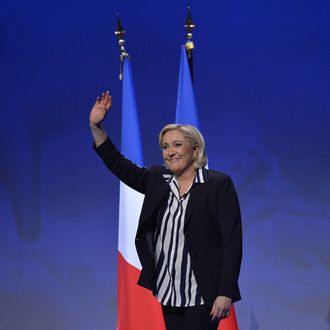
While online activity had some effect on Donald Trump’s victory last November, the alt-right is finding it harder to spread its message in France, where far-right candidate Marine Le Pen will face off against Emmanuel Macron in a runoff election on Sunday. According to the New York Times, the online campaigns — targeted at France, but often organized and executed from the United States — are having significantly less effect on shaping the election.
Much of the alt-right’s messaging, specifically the in-crowd slang that can often appear impenetrable, doesn’t translate well to France. French academic David Chavalarias analyzed more than 80 million tweets, and found that “[a]lmost two-thirds of Twitter messages using the hashtag MFGA — or Make France Great Again — have originated from the United States,” failing to penetrate a culture that takes pride in its own language. Fake news has similarly failed to leave a mark.
Far-right memers also did not realize that Pepe the Frog, an innocuous meme turned unofficial alt-right icon, wouldn’t resonate much with French voters, considering that “frog” is used as a slur to refer to French people.
And last but not least, the French meme campaigners have been hampered by a lack of mainstream-media enablers. In the United States, sites like Breitbart openly embraced alt-right meme tactics, but no equivalent has emerged in France. Nor have outlets been triggered and outraged by offensive memes, thus spreading them via pushback coverage.
It all goes to show that the alt-right’s strategy is not universally applicable, and demonstrates the limits of how easy it is to manipulate a country’s media and elections from outside its borders. That being said, this isn’t the first time people have underestimated the online horde.





























